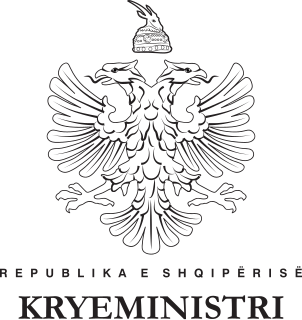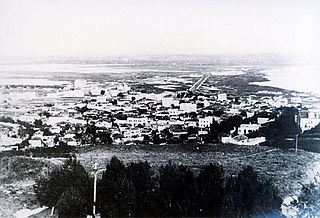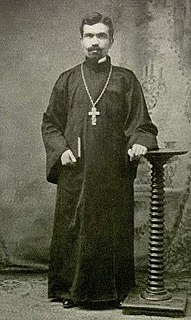
Myfid bej Libohova was an Albanian economist, diplomat and politician and one of the delegates at the Assembly of Vlora where the Albanian Declaration of Independence took place. He served as the first Minister of Interior of Albania, during the Provisional Government of Albania and since then has held different government positions on nine occasions between 1913–1927, holding the positions of Justice Minister, Minister of the Interior, Minister of Finance, and Minister of Culture.

Dhimitër Beratti or Berati was an Albanian politician and journalist. One of the signatories of the Albanian Declaration of Independence Berati served as secretary of the Albanian delegation at the Paris Peace Conference in 1919.
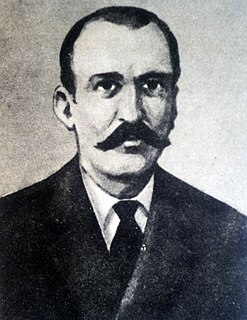
Pandeli Sotiri (1842–1892) was an Albanian activist that acted as director of the first Albanian school of modern times in Korçë. Sotiri was one of the most important Rilindas figures that contributed in the propagation of the Albanian language. He also worked on one of the versions of the Albanian alphabet. The Congress of Monastir based Albanian's alphabet mostly on Sotiri's precedent work.
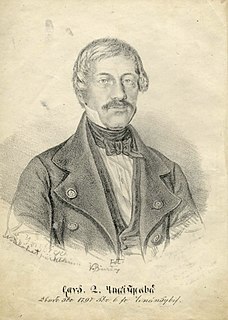
Naum Veqilharxhi, born Naum Panajot Bredhi (1797–1846), was an Albanian lawyer and scholar. In 1844, he created a unique alphabet for the Albanian language using characters he had created himself, the Vithkuqi script. Veqilharxhi is one of the most prominent figures of the early Albanian National Awakening, and is considered by Albanians as its first ideologue.

Christo Dako, son of Anastas Dako, was an Albanian patriot and publisher of the early 20th century.

Themistokli Gërmenji (1871—1917) was an Albanian nationalist figure and guerrilla fighter. One of the activists of the Albanian National Awakening and the leader of the Albanian irregulars from 1909 to 1914, he became the prefect of police of the Autonomous Albanian Republic of Korçë from 1916 until his execution due to a miscarriage of justice by a French military tribunal in 1917.

The Committee for the National Defence of Kosovo was an Albanian organization illegally founded in Shkodër at the beginning of November 1918. It was mainly consisted of the political exiles from Kosovo and was led by Hoxha Kadri from Priština. It existed in looser form since May 1915.

The Black Society for Salvation was a secret Albanian nationalist society established in 1909. Its main task was to organize uprisings in southern Albania and Macedonia struggling for the unification of the four Ottoman vilayets with the substantial Albanian population into one autonomous political unit with its own government and parliament. The members of the society considered the armed rebellions as legitimate means for achieving their aims.

Kristo Shuli, full name Kristo Panajot Shuli, also known as Kristo Sulidhi, (1858-1938), was an Albanian photographer and writer of the 19th and early 20th century. He was born in the village of Marjan of the region of Opar. He emigrated to Greece where he wrote in Anastas Kullurioti's weekly The Voice of Albania,. One of his most important poems was a ballad of 150 verses entitled The Albanians who fight in Gucia. He returned to Albania and worked in Korçë as a photographer. One of his most important photos is the one that documented the first Albanian school, opened in 1887.
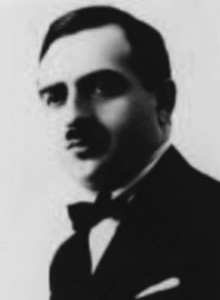
Kostandin Boshnjaku (1888–1953) was an Albanian banker, and politician. He was one of the earliest Albanian communists.
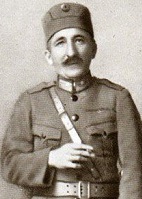
Hysni Curri (?–1925) was a Kosovar Albanian military figure and a prominent leader of the Kachak movement and the Committee for the National Defence of Kosovo.
Besa-Besën was an organization of Albanian emigrants in Boston, Massachusetts.

Mihal Turtulli (1847–1935), also known as Michal Tourtoulis or Dr. Turtulli, was an Albanian oculist, politician, member of High Council of State, and representative of Albania in the Paris Peace Conference, 1919.
Riza Dani (1884–1949) was an Albanian politician and activist of the 20th century.
The Second Congress of Manastir was an Albanian congress held on 2–3 April 1910 in Manastir, back then Ottoman Empire, today's Bitola in the Republic of Macedonia. It dealt with the challenges that the Albanian language and schools faced at the time within the context of the empire, and the platform to overcome them.

Mësonjëtorja or The Albanian School was the first secular school in the Albanian language within Ottoman Albania. It was opened in Korçë during the late Ottoman period. The school building serves as a museum and is located on the north side of Bulevardi Shën Gjergji.
The Congress of Elbasan, also known between Albanians as the Congress of the Albanian schools, was held from 2 to 8 September 1909 in Elbasan, today's Albania, back then part of the Vilayet of Monastir of the Ottoman Empire. The congress, sponsored by the local Bashkimi literary club, was attended by 35 delegates from central and southern Albania.

Menduh Zavalani (1889–1914) was an Albanian revolutionary and political leader active during the last years of the Albanian National Awakening. He formed his own revolutionary band and was one of the leaders that liberated Përmet and the environs from the Ottoman Empire. Menduh was an appointed delegate from his hometown Korça to the Albanian National Congress that proclaimed the Independence of Albania. In the intellectual level Menduh was noted for the translation of Friedrich Schiller's drama Wilhelm Tell into Albanian. He was assassinated at a very young age near Pogradec by a local collaborationist band.
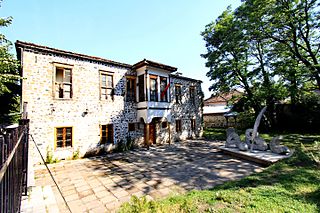
The National Museum of Education, it is a national museum located in Korçë, Albania. The museum is set up in the building where the March 7, 1887 opened the first Albanian school, otherwise known as Mësonjëtorja. It contains the history of Albanian writing and Albanian publications, such as the first Albanian alphabet written by patriot Naum Veqilharxhi and the second Albanian alphabet written by Kostandin Kristoforidhi. There are also pictures and photos of prominent patriots who contributed to the opening of the school, such as Pandeli Sotiri, Petro Nini Luarasi and Nuçi Naçi.
Thimi Marko was a figure from Korçë involved in the Albanian National Awakening during the late Ottoman period.


